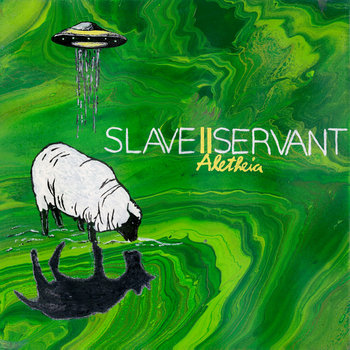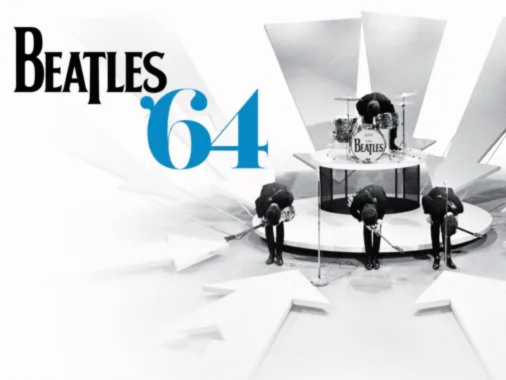
“Alethia;” goddess of truth. At least according to a quick Google search.
We are known as the information age for a reason. Attached at the hand and hip to devices capable of delivering billions of articles and media pages at light speed. At the precipice of human innovation, caught in the crosshairs of truth. What is the truth by today’s standards? It is determined by the onlooker. Perception itself is influenced by how to filter reality and parse it to determine legitimacy; eliminating external influences and leaving one with their own sense of the truth. In their personal search for modern truth, a former suburban Chicago musician documented their search for truth in song, looking to make their personal statement.
“Alethia” is the initial EP by post-hardcore indie rock band, Slave II Servant. Released digitally on April 1, 2022, vocalist, guitarist and main songwriter Sam Swanson described the EP as an “exploration of my own personal faith.”
“God made us kings and queens, and we were made to rule over only ourselves, not over anyone else.”
Swanson is a Chicagoland native. Formerly of the bands Midwest Blue (which has been covered on Killer Klassix before) and DormLife.
“Alethia” is dubbed by Swanson as his “personal journey to find truth in a polarized social climate.” Composed of four tracks and based on the life experiences of a solo traveling musician, Swanson is eager to demonstrate what he has learned in 20-plus years as a musician, sharing his findings through complex rhythms, fun melodic hooks, and distinguished instrumentation characterized by his performance on the tracks.
“Always Greener” begins the search for truth; it sets the tone for the EP and for Swanson’s standard of talent. The track is well-composed, exhibiting both extensive knowledges of melodies and eclectic fusions of hardcore, pop and funk. Swanson’s lyricism aligns semi-perfectly with his ability to write intricate, polyrhythmic guitar melodies. Given the track’s lyrical theme, highlighting the polar divide of modern society, denoted by the bridge: “Said it like we meant it/ but we bled it ended up on the fence/and then regretted as we fled it/ dreaded our consequences coulda mended insteada shredded.” It solidifies the relativity of the socio-political divide and perfectly captures it in the stop-start bridge where the music characterizes the volatility of finding no progress.
“Mutton” thematically and musically further explores truth, maintaining the same high standards. Couched with a biblical narrative of individuals being sheep, driven and contained by a shepherd; the track’s dismal nature is a stark contrast to the bouncy, down-tuned pop-infused, alt-rock structure. That being said, the track is well composed and driven by Swanson’s layered melodies that range from the guitar-supporting chugs that frame the song to the bouncy nature of the drums, progressing the song from hook to verse. In the context of the greater narrative; the track pinpoints building tensions and asserts blame in the laps of leaders on all fronts, highlighting the prioritization of profit over people.
“Second, Second Coming” is a song that harkens to his days in both DormLife and Midwest Blue, leaning into punk and post-hardcore elements to support Swanson’s melodic exploration of truth. Both ambitious to exhibit his skill and demonstrative of his previous musical ambitions, the track is fun and perfectly modernizes the genre. Immediately tempo-setting, the track lyrically explores the fallacy of “alternative-fact” extremism, using the biblical “second coming” to metaphorically and satirically denote the next grand cataclysm in American history as a mirage perpetuated only to invoke fear and divide individuals. The music perfectly cradles the narrative theme, in its oppositional nature and gritty rhythmic guitars, while still supporting the main hook. However, for the choral hook, I personally am not a fan of hooks that elongate or repeat the same vowels or words more than once, which occurs at least twice in this track.
“Wool” is the conclusive track, wonderfully departing and continuing. While the song leans into a more R&B, soulful composition, the thematic exploration returns to the “sheep” reference. This time, remixing a more choral and well-rooted understanding of melodics and dynamics into a track about self-discovery. The narrative itself is complex but works a melodic track of admonishment in Swanson exhibiting his own discovery of truth through his faith. Whereas a listener might easily mistake this track as a Christian praise track, the song is anything but, criticizing practices of prioritizing spiritual faith over that of the potential of man and having faith in individuals.
Slave II Servant’s talents are not only helmed by a seasoned veteran but exhibit a distinctive quality. It distinguishes the band not just as an advocate for individual rights, but as placing faith in man’s ability to govern themselves as individual entities. The EP is catchy and interesting in regards to its themes of exploration and is a powerful cumulative effort, 20 years in the making.
4/5
The album itself can be digitally purchased at a pay-what-you-want rate at the link below:








